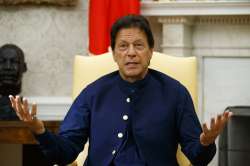Imran Khan claims Pakistan's ISI led US to find and kill Osama Bin Laden
The point to be noted here is Pakistan had until now officially denied having any knowledge of the terror chief until he was shot dead in a night time raid by US special forces on May 2, 2011.

Pakistan Prime Minister Imran Khan has claimed that it was Islamabad's main spy agency that led to the United States finding and killing al-Qaeda leader Osama bin Laden.
The point to be noted here is Pakistan had until now officially denied having any knowledge of the terror chief until he was shot dead in a night time raid by US special forces on May 2, 2011. This incident was referred to many as a national embarrassment to Pakistan -- and it caused ties between the two countries to nosedive.
Imran Khan is currently on a visit to Washington on his first official trip. He made his claim in an interview with Fox News when he was asked whether his country would release a jailed doctor whose fake immunisation drive helped the US track and kill bin Laden in 2011.
Responding to questions, Khan was reluctant to give any commitment on the release of the Pakistani doctor Afridi. US President Trump is seeking his release.
"This is a very emotive issue, because Shakeel Afridi in Pakistan is considered a spy," he said on Monday, adding, "we in Pakistan always felt that we were an ally of the US and if we had been given the information about Osama bin Laden, we should have taken him out."
The host of the show then asked Khan if he understood the skepticism around the Inter Services Intelligence (ISI) for leaking key information, to which he replied: "And yet it was ISI that gave the information which led to the location of Osama bin Laden.
"If you ask CIA it was ISI which gave the initial location through the phone connection."
Khan said that Pakistan was fighting the war against terrorism for the US. The raid and killing of Osama, he said "hugely embarrassed Pakistan".
"Here we were an ally of the US and the US did not trust us. And they actually came and bombed and killed a man in our territory,” Khan said.
When pointed out that Osama was not just a man, but a terrorist who killed more than 3,000 Americans, Khan said that Pakistan lost 70,000 people in this fight.
"We were fighting this war for the US and we lost all these people fighting this war. So there was obviously a lot of anger about the way this whole thing was done. But you know, that's all in the past,” Khan said.
When the interviewer asked, "You are the prime minister, you can make a decision," Khan said. "There's some decisions that are democracy which even a prime minister finds it difficult, because we do have an Opposition. But this is something that can be negotiated over time."
Khan also said he would be willing to consider releasing Afridi in exchange for Pakistani neuroscientist Aafia Siddiqui, who is serving an 86-year US prison sentence after her 2010 conviction of shooting at FBI agents and soldiers.
"So, we could negotiate some sort of swap," Khan said, adding that this was not talked about during his meeting with President Trump in the White House on Monday.
The negotiations for swap of Afridi and Siddiqui could take place in the future, he said. "We can negotiate. I mean, no negotiations have started," Khan confirmed.
(with inputs from IANS)